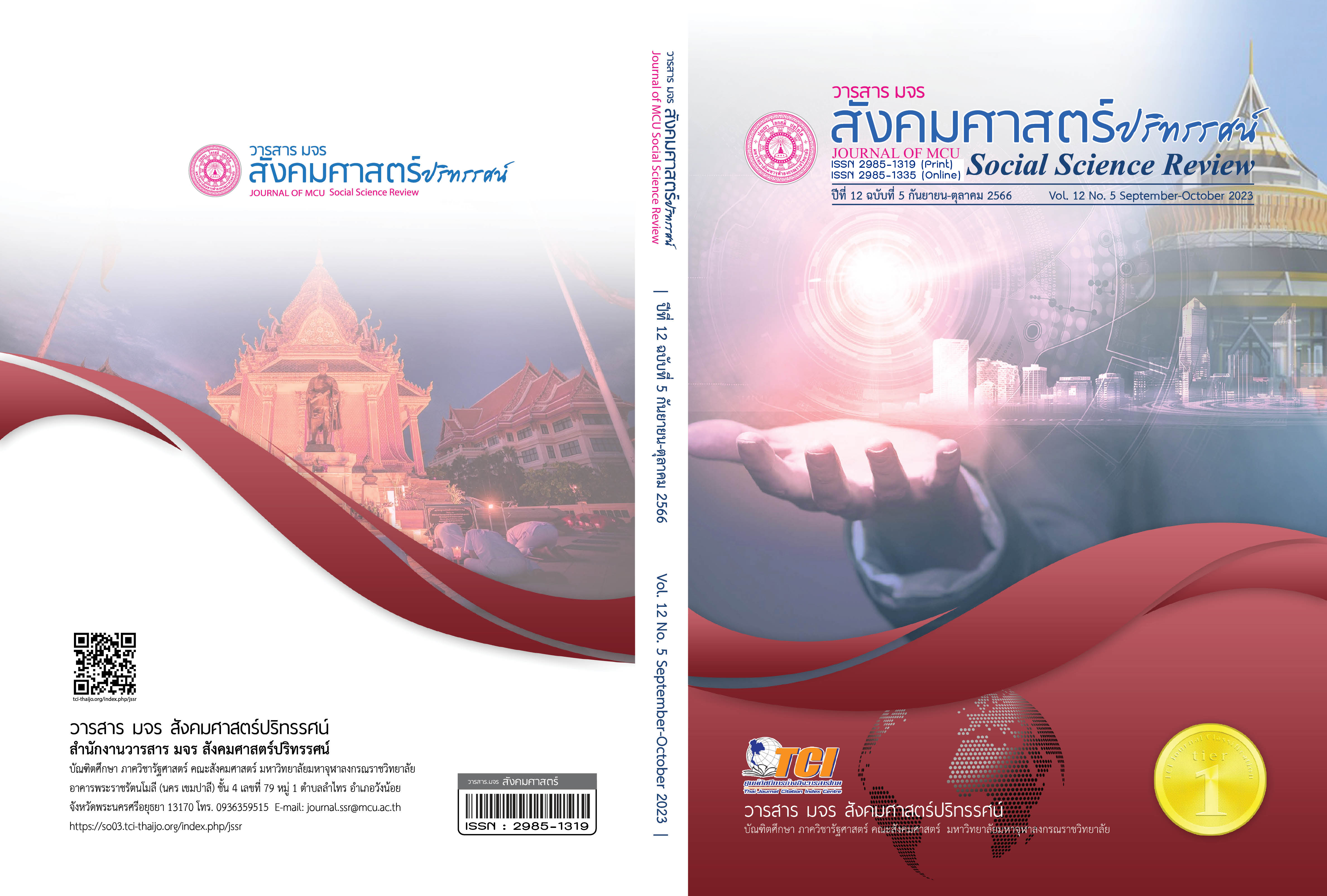การพัฒนารูปแบบการบริหารจัดการเพื่อสร้างเสริมภาวะผู้นำในตนเอง ของเด็กปฐมวัย ในโรงเรียนเอกชนจังหวัดเชียงใหม่
คำสำคัญ:
รูปแบบการบริหารจัดการ, ภาวะผู้นำในตนเอง, เด็กปฐมวัยในโรงเรียนเอกชนบทคัดย่อ
บทความวิจัยนี้มีวัตถุประสงค์ 1. ศึกษาสภาพ และปัญหาการบริหารจัดการเพื่อสร้างเสริมภาวะผู้นำในตนเองของเด็กปฐมวัยฯ 2. พัฒนา ตรวจสอบรูปแบบและคู่มือการใช้รูปแบบการบริหารจัดการฯ และ 3. ประเมินรูปแบบ และคู่มือการใช้รูปแบบการบริหารจัดการฯ ผู้ให้ข้อมูล มี 2 กลุ่ม ได้แก่ 1) ผู้ทรงคุณวุฒิและผู้เชี่ยวชาญในการสนทนากลุ่ม สัมภาษณ์ ประชุมเชิงปฏิบัติการ สัมมนาอิงผู้เชี่ยวชาญ และประชุมประชาพิจารณ์ ได้มาโดยการเลือกแบบเจาะจง และ 2) ผู้บริหาร และครูผู้สอน ได้มาโดยการกำหนดขนาดกลุ่มตัวอย่างด้วยตารางสำเร็จรูปของ Krejcie & Morgan (1970) และสุ่มอย่างง่าย เก็บรวบรวมข้อมูลด้วยการตอบแบบสอบถาม วิเคราะห์ข้อมูลโดยใช้ ความถี่ ร้อยละ ค่าเฉลี่ย ส่วนเบี่ยงเบนมาตรฐาน และการวิเคราะห์เนื้อหา
ผลการวิจัยพบว่า 1. สภาพการบริหารจัดการฯ โดยภาพรวม มีค่าเฉลี่ยอยู่ในระดับมาก สำหรับปัญหาการบริหารจัดการฯ โดยภาพรวมมีค่าเฉลี่ยอยู่ในระดับปานกลาง 2. รูปแบบการบริหารจัดการ พบว่า มี 4 ส่วน ได้แก่ 1) เป้าหมายและหลักการ 2) วัตถุประสงค์ 3) ระบบและกลไกการบริหารจัดการเพื่อสร้างเสริมภาวะผู้นำในตนเองของเด็กปฐมวัย และ 4) เงื่อนไขความสำเร็จ ส่วนคู่มือการใช้รูปแบบฯ มี 3 ตอน ได้แก่ 1) บทนำ 2) รูปแบบการบริหารจัดการ และ 3) กระบวนการสร้างเสริมภาวะผู้นำในตนเองของเด็กปฐมวัย รวมทั้งภาคผนวก โดยผลการตรวจสอบฯ พบว่า ทุกรายการมีความถูกต้อง และเหมาะสม 3. การประเมินรูปแบบและคู่มือการใช้รูปแบบฯ พบว่าทุกรายการมีความเป็นไปได้และเป็นประโยชน์ มีค่าเฉลี่ยอยู่ในระดับมากที่สุดจินตามยปัญญา และภาวนามยปัญญา
เอกสารอ้างอิง
ประกาศกระทรวงศึกษาธิการ เรื่อง ให้ใช้มาตรฐานการศึกษาระดับปฐมวัย ระดับการศึกษาขั้นพื้นฐานและระดับการศึกษาขั้นพื้นฐานศูนย์การศึกษาพิเศษ (2561, 24 กันยายน). ราชกิจจานุเบกษา. เล่ม 135 ตอนพิเศษ 235 ง. หน้า 4-5.
วราลี ถนอมชาติ และคณะ. (2560). การพัฒนาโปรแกรมการเรียนรู้โดยใช้ประสบการณ์เป็นฐานเพื่อพัฒนาการจัดการเรียนรู้ให้แก่เด็กปฐมวัยในยุคเจเนอเรชั่นอัลฟา สำหรับนักศึกษาวิชาชีพครู (รายงานผลการวิจัย). จันทบุรี: มหาวิทยาลัยราชภัฏรำไพพรรณี.
สรวงมณฑ์ สิทธิสมาน. (2557). ถึงเวลาปฏิรูปเรื่องภาวะผู้นำได้แล้ว. สืบค้น 20 เมษายน 2564, จาก https://mgronline.com/qol/detail/9570000047944
สำนักงานคณะกรรมการการศึกษาขั้นพื้นฐาน. (2560). หลักสูตรการศึกษาปฐมวัย พุทธศักราช 2560. กรุงเทพฯ: สำนักพิมพ์โรงพิมพ์ชุมนุมสหกรณ์การเกษตรแห่งประเทศไทย.
สำนักงานเลขาธิการสภาการศึกษา. (2562). รายงานเฉพาะเรื่องที่ 6 ความสำคัญและความจำเป็นในการตราพระราชบัญญัติการพัฒนาเด็กปฐมวัย. กรุงเทพฯ: พริกหวานกราฟฟิค.
______. (2561). คู่มือการเสริมสร้างวินัยนักเรียนในสถานศึกษาระดับการศึกษาขั้นพื้นฐานด้านความรับผิดชอบและการตรงต่อเวลา. กรุงเทพฯ: พริกหวานกราฟฟิค.
______. (2563). สภาวะการศึกษาไทย 2561/2562 การปฏิรูปการศึกษาในยุคดิจิทัล. กรุงเทพฯ: ภาพพิมพ์.
Covey, S.R. (2008) The Leader in Me. New York: A Division of Simon & Schuster, Inc.
Krejcie, R.V. & Morgan, D.W. (1970). Determining Sample Size for Research Activities. United State of America: Education and Psychological Measurement.
Scott, J. (1990). A Matter of Record Documentary Sources in Social Research. Cambridge, Policy Press.
World Economic Forum. (2016). Technology; Skills and knowledge; Teaching and learning; Culture and society. Retrieved March 20, 2020, from http://www3.weforum.org/docs/WEF_New_Vision_for_Education
ดาวน์โหลด
เผยแพร่แล้ว
รูปแบบการอ้างอิง
ฉบับ
ประเภทบทความ
สัญญาอนุญาต
ลิขสิทธิ์ (c) 2023 วารสาร มจร สังคมศาสตร์ปริทรรศน์

อนุญาตภายใต้เงื่อนไข Creative Commons Attribution-NonCommercial-NoDerivatives 4.0 International License.
เพื่อให้เป็นไปตามกฎหมายลิขสิทธิ์ ผู้นิพนธ์ทุกท่านต้องลงลายมือชื่อในแบบฟอร์มใบมอบลิขสิทธิ์บทความให้แก่วารสารฯ พร้อมกับบทความต้นฉบับที่ได้แก้ไขครั้งสุดท้าย นอกจากนี้ ผู้นิพนธ์ทุกท่านต้องยืนยันว่าบทความต้นฉบับที่ส่งมาตีพิมพ์นั้น ได้ส่งมาตีพิมพ์เฉพาะในวารสาร มจร สังคมศาสตร์ปริทรรศน์ เพียงแห่งเดียวเท่านั้น หากมีการใช้ภาพหรือตารางหรือเนื้อหาอื่นๆ ของผู้นิพนธ์อื่นที่ปรากฏในสิ่งตีพิมพ์อื่นมาแล้ว ผู้นิพนธ์ต้องขออนุญาตเจ้าของลิขสิทธิ์ก่อน พร้อมทั้งแสดงหนังสือที่ได้รับการยินยอมต่อบรรณาธิการ ก่อนที่บทความจะได้รับการตีพิมพ์ หากไม่เป็นไปตามข้อกำหนดเบื้องต้น ทางวารสารจะถอดบทความของท่านออกโดยไม่มีข้อยกเว้นใดๆ ทั้งสิ้น





